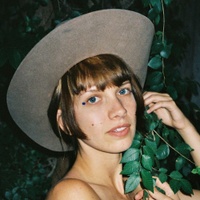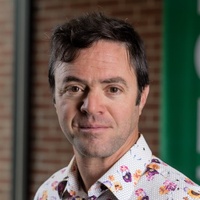On resisting formality
Prelude
keiyaA is a singer-songwriter, producer and multi-instrumentalist based in NYC. Raised in Chicago’s South Side, keiyaA synthesizes her jazz training, R&B sensibilities, and hip-hop upbringing to create new soul sounds inundated with her powerful, sultry voice and dense lyricism. She aims to center the narrative and intellect of the Black woman in the late-stage capitalist world. Her sophomore album, hooke’s law, is out with XL Recordings Ltd. In her experimental play, milk thot, which keiyaA performed at The Abrons Art Center in Manhattan, finds her confronting and battling her shadow self.
Conversation
On resisting formality
Musician keiyaA discusses learning to self-produce, performing despite never being a theater kid, and meaningfulness as a measure of success.
As told to Mary Retta, 1475 words.
Tags: Music, Beginnings, Family, Process, Production, Independence, Success.
How long have you been making music, and how did you come to it?
I’ve been making music for a long time, since I was really little. I grew up in a house with my mom and my grandma and my uncle and my brother, and she had an old Casio keyboard in the house. It was one of those keyboards that would teach you some songs. They’d light up the keys. So I kind of taught myself how to play whatever was on the keyboard, and they had little drum beats in it, and you could play along to it or whatever. I remember jamming on that when I was as young as five. And my mom says that I used to learn commercial jingles and play that. I don’t really remember that, but I trust her.
I joined the Chicago Children’s Choir for a bit, but I didn’t really get really engaged with music until I was eight or nine. And then when I started grade school and high school, it got really serious kind of out of nowhere with jazz. I just became a very serious jazz saxophonist. I kind of got lucky because I was in what I consider maybe the last phase of culturally specific music education in Chicago public schools. I think they’ve taken away the funding for a lot of that now… We would have competitions across Chicago public school bands where you’d win medals, and my school would host a competition sometimes.
I know you’re involved in a lot of the production of your music and the arrangements of your music. Can you talk a bit about why that was important to you, and how you taught yourself the production elements of music making?
It was important to me without me realizing for a while. I kind of grew up thinking that either you sang or you played, or you were in the band kind of thing. You’re not both. I didn’t really understand you could make music on the computer or anything like that yet. So because I wanted to be a singer but didn’t sing, and was playing the horn and playing piano and jazz, I thought that I would just be a producer, ultimately.
Later on when I made the decision to try to sing, and was trying to work with producers, most of the people that I was around were just a bunch of guys with egos. I didn’t realize that I was also record producing by being like, “Oh, I want this here, or this sound there, or whatever.” I was just like, “Alright, fuck these guys. I can play an instrument, so I can figure out how to make beats.” To be honest, I heard PartyNextDoor’s first mix tape and learned that he self-produced that whole thing and did his vocal production and stuff, and that really gave me the motivation. I was like, “Oh, I can do this. I can be a one man band.” I don’t really need anybody.
Can you walk me through what producing a song looks like?
Right now it just kind of looks like me sitting at my computer and low-key improvising. I don’t really come with a set idea. I just start with something and see what that thing inspires me to make, and then I’ll build off that. So sometimes I’ll start with a synthesizer sound or a piano sound and just start playing notes, and based off of how that sounds it’ll inspire me to play a certain type of chord or something like that. And then that’ll inspire the bassline, which will then inspire the drums, which will then make it a thing that inspires melodies, that eventually become the song I’m writing.
In terms of your lyrics, do you find that those come before the production or after?
Usually after. I write poetry, and I journal a lot and brain dump a lot, so sometimes I’ll play with those that are already set. But for the most part, it’s kind of like I’ll sing “word sounds” that are directly tied to whatever melody that comes to my head. And then once I get the word-sound melody that I like, I’ll write lyrics to that, if that makes sense.
So it’s really sound based, and then you write the lyrics based on the feeling of it.
Yeah, yeah, it’s sound and rhythm-based. I tried to do that a lot less with my last album, but I definitely on my first album was only choosing words that rhythmically and phonetically sounded like the melody that I was singing.
I have to ask you about milk thot because I saw it and I thought it was so brilliant. Obviously the play itself was incredible, but everything from the dancing to the costuming to the lighting, it just seemed so intentionally thought out and executed. So first of all, congratulations. How did you decide to write the play? Was it difficult to write a play instead of a poem? I understand you were involved in a lot of different aspects of the show.
I basically creative directed and co-directed the whole show. I wrote the show, and it kind of came to me through improvising. I knew that if I was going to perform, I wanted it to be more than just me and the band, or me and my computer. And performance art was something that was really important to me since I was young, but I kind of shied away from it and just did the whole instrument/band thing.
I felt like I really only had examples of the white, downtown New York theater girls. I thought, “I’m not a young dancer or theater kid, so how do I get access to the performance art world in a way that is researched and informed and learning from others, but still not abide to the system?” I decided to keep it to myself and play with house furniture and this idea of doing things in the domestic space and more surrealism, less fantastical-ism.
Then I realized, I guess my art is also going to be about my experience being an artist and my general human experience being on the phone all the time. Those are basically the only ideas I had: domestic space and then the whole mirror-camera-screen-projection thing. And I had some hooke’s law demos, but only three or four. It was hard because I definitely was trying to resist the formality of it. They’re like, “KeiyaA, we need a script.” And I was like, “Are you sure?” They’re like, “We need a fucking a script. We need to know what this is.” I was like, “Oh, it’s in my head!” So that was a process. And I had to start working Monday through Friday 9 to 5 instead of whenever I wanted. But we got through, and it was great.
In terms of looking forward in your career, do you feel like you’re going to continue with theater or try different mediums?
I definitely want to continue to do theater. I think milk thot as a show needs to be toured. It needs to be seen by more people. But in general, I want my live show to continue to be informed by the theatrical elements I’ve learned in theater and performance art. I think there’s a way to meld the two.
What does success mean to you as an artist?
To me, success as an artist is getting as much of my audience as humanly possible. The people that would like you if they knew about you—them knowing about me, and as many of them knowing about me as possible, and just being able to live my life off my art. It’s pretty simple to me. Yeah, I would love Grammys and I would love critical recognition, and I would love artist/peer recognition as well. I want to be someone that somebody considers part of a tradition that was important to people, who made music that was meaningful to people.
If you could give one piece of advice, either to your former self or to someone who’s just starting out as a musician or an artist today, what would you say?
This question is always really hard for me. If I could give a piece of advice to my younger self, I would say, “Focus on the things that make you happy, and the love you’re seeking in your life will come from that.” I think that could be general advice for other people, too.
- Name
- keiyaA
- Vocation
- musician, producer
Some Things
Pagination



